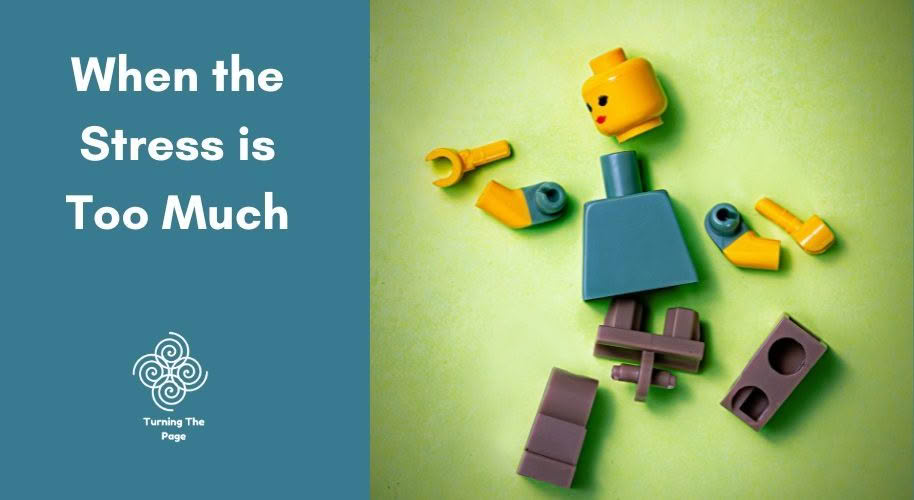The stress load was too much to handle, but they knew what to do, so they took action and calmed the stress load down.
It was just getting too much, and I could feel it in my body.
This was the experience from last weekend when I had a very busy social time.
Meeting new people, trying out new things, and so much change that my introvert self was longing for seclusion, or to simply have some quiet time with just one person.
I withdrew a little, had a break, and now my cup has been restored.
The important thing was that I recognised this, was able to communicate my needs, and give myself self care.
- What stresses you?
- What fills your cup and what drains it?
- Do you know when the stress load is too much or it’s getting near its ‘camel straw’ breaking point?
I know you’re not a camel. Camels never read my blog posts, but as the saying goes ‘It’s the final straw that breaks the camel’s back’
So how is your back? What sized load are you carrying and what could be a final straw?
When the stress is too much.
Many years ago I was taught a model called the Stress-Vulnerability model developed by Dr. Ian Falloon.
The little video below goes through the basic principles of it, but one of the key teachings I took from it was that if you put the body under too much stress, then the body will express signs of unwellness.
It could be high blood pressure, stomach ulcers, migraines, etc but for us, with an interest in Mental Wellness, it could be signs of mental unwellness – depression, anxiety, panic, loss of sleep, and possibly even psychosis.
The stress load reaches a peak where it is too much for the body to handle.
Please watch the video to get most out of this post.
Every body has its limits
Everybody has a body, and every ‘body’ has its limits.
It is human to be fragile, and there are no supermen or superwomen.
Put anyone under enough stress and they will crack.
Even Jesus, fully human and fully divine, had his limits and I thank God that the recorders of his story included his human fragilities and needs.
Imagine the energy drain upon Jesus as he walked the countryside and had a mass of people hanging off his every word and miracle.
His human body had its limits, so he withdrew for rest and recuperation.
More than ever, the word about Jesus spread abroad; many crowds would gather to hear him and to be cured of their diseases. But he would withdraw to deserted places and pray. Luke 5:15-16.
He also gave permission for others to minister to his needs.
She came with a bottle of very expensive perfume and stood at his feet, weeping, raining tears on his feet. Letting down her hair, she dried his feet, kissed them, and anointed them with the perfume. Luke 7:36
The night before he was going to be crucified, he was so full of anxiety that he sweated blood. The body had reached its extreme limits of anxiety.
In his anguish, he prayed more earnestly, and his sweat became like great drops of blood falling down on the ground. Luke 22:44 (Hematohidrosis)
Breaking it down
A key to learning how to handle the stress load you carry is to breakdown the various stressors you are carrying.
In the video above, you will see how the stress load is comprised of various stressors
For me, as I write this post, I could list some of my stressors.
- Car problems
- Garden machinery breakdowns
- Housing uncertainty
- Bills to pay
- Teeth and going to dentist tomorrow (Arggh $$)
- Unresolved issues from the past (we all have these and I always include it on the list)
What I have found to be helpful is to treat the problems as problems and not to personalise them.
My lawnmower breaking down is not about me, it’s simply a tool that I use a lot, therefore it will need repairs, therefore it’s simply a problem to be solved. Nothing more, nothing less.
Taking a pragmatic, non-emotional, look at each of the problems helps me problem solve each of them and gain a sense of agency or control over them. As I do this again and again, my brain learns confidence to face into other problems.
As each stressor becomes less, the overall stress load reduces to where I am feeling that the stress load is not too much.
I have learned to break it down before it breaks me down.
Simple wisdom and any one can do it.
To simply stand back, make a list, and to begin working away at the list helps us to reduce the stress load.
Questions?
Comments?
Email me 🙂📨
barry@turningthepage.co.nz
Give a little gift to keep the pages turning
Quotes to consider
- Strength is not the absence of vulnerability. Strength is knowing what your weaknesses are and working with them. Terrence Real
- Stress is directly related to fear. Is anxiety accumulating in your life? The Comforter is always near, but first, you must adopt His perspective. David Riddell
- When stress levels rise, do four things. Relax. Breathe deeply. Tell yourself the truth. Face your secret fear. David Riddell
- Much of the time, we rev up and race about because of unnecessary internal pressures (like unrealistic standards for ourselves) or because external forces are trying to hurry us along for their own purposes (not because of our own needs). Rick Hanson
- The antidote to stress, depression, anxiety, despair is to be on then off, work play, inhale exhale, summer winter. Rhythm is built into creation, and the problem with the modern world is that you can get tomatoes at 2 am Rob Bell
- What I fear most about stress is not that it kills but that it prevents one from savouring life. Jean-Louis Seven-Schreiber
Questions to answer
- What are ten things are that are causing you stress at the moment?
- What happens in your body when the stress load gets too mmuch?
- Caring for others can be a huge stress loading on the self. How do you care for you?
Formation exercise
- Reflect over your life and moments when it ‘All got too much.’ What helped? What hindered? What have you learned about yourself?
Further reading
Barry Pearman
Photo by Jackson Simmer on Unsplash





